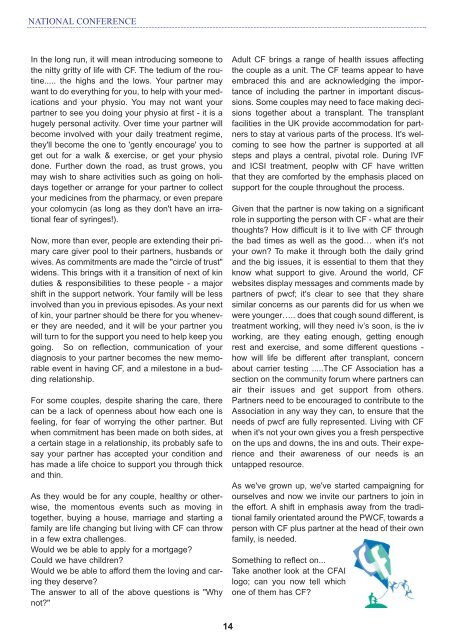E-INTERVIEW with Michael Cunningham - Cystic Fibrosis ...
E-INTERVIEW with Michael Cunningham - Cystic Fibrosis ...
E-INTERVIEW with Michael Cunningham - Cystic Fibrosis ...
You also want an ePaper? Increase the reach of your titles
YUMPU automatically turns print PDFs into web optimized ePapers that Google loves.
NATIONAL CONFERENCE<br />
In the long run, it will mean introducing someone to<br />
the nitty gritty of life <strong>with</strong> CF. The tedium of the routine.....<br />
the highs and the lows. Your partner may<br />
want to do everything for you, to help <strong>with</strong> your medications<br />
and your physio. You may not want your<br />
partner to see you doing your physio at first - it is a<br />
hugely personal activity. Over time your partner will<br />
become involved <strong>with</strong> your daily treatment regime,<br />
they'll become the one to 'gently encourage' you to<br />
get out for a walk & exercise, or get your physio<br />
done. Further down the road, as trust grows, you<br />
may wish to share activities such as going on holidays<br />
together or arrange for your partner to collect<br />
your medicines from the pharmacy, or even prepare<br />
your colomycin (as long as they don't have an irrational<br />
fear of syringes!).<br />
Now, more than ever, people are extending their primary<br />
care giver pool to their partners, husbands or<br />
wives. As commitments are made the "circle of trust"<br />
widens. This brings <strong>with</strong> it a transition of next of kin<br />
duties & responsibilities to these people - a major<br />
shift in the support network. Your family will be less<br />
involved than you in previous episodes. As your next<br />
of kin, your partner should be there for you whenever<br />
they are needed, and it will be your partner you<br />
will turn to for the support you need to help keep you<br />
going. So on reflection, communication of your<br />
diagnosis to your partner becomes the new memorable<br />
event in having CF, and a milestone in a budding<br />
relationship.<br />
For some couples, despite sharing the care, there<br />
can be a lack of openness about how each one is<br />
feeling, for fear of worrying the other partner. But<br />
when commitment has been made on both sides, at<br />
a certain stage in a relationship, its probably safe to<br />
say your partner has accepted your condition and<br />
has made a life choice to support you through thick<br />
and thin.<br />
As they would be for any couple, healthy or otherwise,<br />
the momentous events such as moving in<br />
together, buying a house, marriage and starting a<br />
family are life changing but living <strong>with</strong> CF can throw<br />
in a few extra challenges.<br />
Would we be able to apply for a mortgage?<br />
Could we have children?<br />
Would we be able to afford them the loving and caring<br />
they deserve?<br />
The answer to all of the above questions is "Why<br />
not?"<br />
14<br />
Adult CF brings a range of health issues affecting<br />
the couple as a unit. The CF teams appear to have<br />
embraced this and are acknowledging the importance<br />
of including the partner in important discussions.<br />
Some couples may need to face making decisions<br />
together about a transplant. The transplant<br />
facilities in the UK provide accommodation for partners<br />
to stay at various parts of the process. It's welcoming<br />
to see how the partner is supported at all<br />
steps and plays a central, pivotal role. During IVF<br />
and ICSI treatment, peoplw <strong>with</strong> CF have written<br />
that they are comforted by the emphasis placed on<br />
support for the couple throughout the process.<br />
Given that the partner is now taking on a significant<br />
role in supporting the person <strong>with</strong> CF - what are their<br />
thoughts? How difficult is it to live <strong>with</strong> CF through<br />
the bad times as well as the good… when it's not<br />
your own? To make it through both the daily grind<br />
and the big issues, it is essential to them that they<br />
know what support to give. Around the world, CF<br />
websites display messages and comments made by<br />
partners of pwcf; it's clear to see that they share<br />
similar concerns as our parents did for us when we<br />
were younger….. does that cough sound different, is<br />
treatment working, will they need iv’s soon, is the iv<br />
working, are they eating enough, getting enough<br />
rest and exercise, and some different questions -<br />
how will life be different after transplant, concern<br />
about carrier testing .....The CF Association has a<br />
section on the community forum where partners can<br />
air their issues and get support from others.<br />
Partners need to be encouraged to contribute to the<br />
Association in any way they can, to ensure that the<br />
needs of pwcf are fully represented. Living <strong>with</strong> CF<br />
when it's not your own gives you a fresh perspective<br />
on the ups and downs, the ins and outs. Their experience<br />
and their awareness of our needs is an<br />
untapped resource.<br />
As we've grown up, we've started campaigning for<br />
ourselves and now we invite our partners to join in<br />
the effort. A shift in emphasis away from the traditional<br />
family orientated around the PWCF, towards a<br />
person <strong>with</strong> CF plus partner at the head of their own<br />
family, is needed.<br />
Something to reflect on...<br />
Take another look at the CFAI<br />
logo; can you now tell which<br />
one of them has CF?



